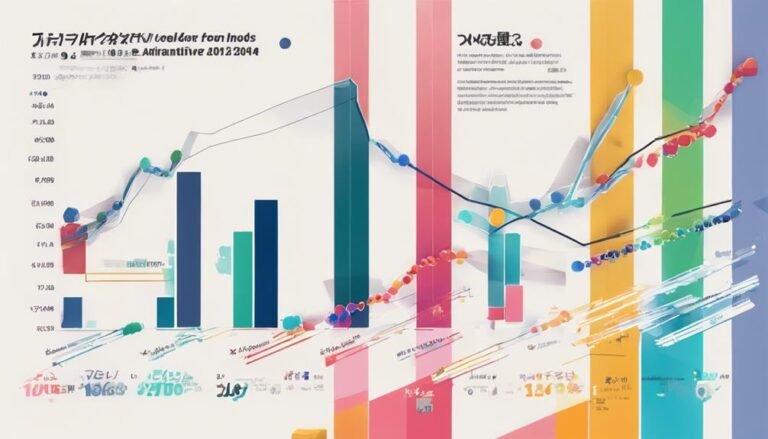Innovations in Fintech Solutions: Shaping the Future of Finance
The landscape of finance is undergoing a profound transformation, driven by continuous advancements in financial technology. Innovations in fintech solutions are reshaping how we interact with money, invest our resources, and plan for the future.
From mobile payment solutions that simplify transactions to the integration of blockchain technology ensuring secure and transparent transactions, the future of finance is being sculpted by cutting-edge technologies.
As AI-powered financial services, peer-to-peer lending platforms, and robo-advisors for investment management gain momentum, the boundaries of traditional finance are being redefined. These innovations hold the promise of a financial world where convenience, accessibility, and efficiency converge seamlessly to redefine the way we manage our finances.
Key Takeaways
- Mobile payment solutions streamline transactions and enhance security.
- Blockchain integration ensures tamper-proof transactions and transparency.
- AI-powered services optimize operations and personalize customer experiences.
- Peer-to-peer lending and robo-advisors revolutionize borrowing, investing, and portfolio management.
Mobile Payment Solutions
The integration of mobile payment solutions within the domain of fintech is revolutionizing the way financial transactions are conducted, offering unparalleled convenience and efficiency to consumers and businesses alike. Contactless transactions and digital wallets have become increasingly popular, enabling users to make payments swiftly and securely through their mobile devices. This shift towards mobile payments has greatly reduced the reliance on traditional payment methods, such as cash or physical cards, leading to a more streamlined and convenient transaction process.
Additionally, the implementation of biometric authentication methods has further enhanced the security of mobile payments, ensuring that transactions are secure and protected from potential fraud or unauthorized access. By utilizing technologies such as fingerprint recognition or facial scanning, users can enjoy peace of mind knowing that their financial information is safeguarded during transactions. This emphasis on secure transactions not only boosts consumer confidence in mobile payment solutions but also paves the way for future innovations in fintech that prioritize data protection and privacy.
Blockchain Technology Integration
With its decentralized and transparent nature, blockchain technology integration in fintech is reshaping traditional financial systems and paving the way for enhanced security and efficiency in transactions. One of the key elements driving this transformation is the decentralized ledger, which allows for secure and tamper-proof recording of transactions across multiple nodes, reducing the risk of fraud and increasing trust among parties involved.
- Decentralized Ledger: By utilizing a decentralized ledger, blockchain technology eliminates the need for a central authority to verify transactions, making the process more efficient and secure.
- Smart Contracts: Smart contracts are self-executing contracts with the terms of the agreement directly written into code. This feature automates the execution of transactions when predefined conditions are met, reducing the need for intermediaries and streamlining processes.
- Enhanced Security: Blockchain technology's cryptographic algorithms ensure that data stored on the blockchain is secure and tamper-proof, enhancing the overall security of financial transactions.
Incorporating blockchain technology into fintech solutions offers a promising future by providing a foundation for more secure, efficient, and transparent financial transactions.
AI-Powered Financial Services
Integrating artificial intelligence (AI) into financial services marks a significant advancement in leveraging technology to enhance operational efficiency and decision-making processes. Machine learning algorithms play a crucial role in AI-powered financial services by analyzing vast amounts of data to identify patterns, trends, and insights that can help financial institutions make informed decisions. These algorithms can automate risk assessment procedures, enabling quicker and more accurate evaluations of potential risks associated with investments, loans, or other financial activities.
AI-powered financial services also offer the advantage of improving customer service through chatbots and virtual assistants that can provide personalized recommendations, answer inquiries, and streamline the customer experience. By automating routine tasks and enhancing data analysis capabilities, AI contributes to cost reductions and operational efficiencies within financial institutions.
Moreover, AI systems can continuously learn and adapt to new information, allowing for real-time adjustments in decision-making processes based on changing market conditions or regulatory requirements. Overall, the integration of AI into financial services represents a transformative shift towards more intelligent, data-driven operations.
Peer-to-Peer Lending Platforms
How do Peer-to-Peer Lending Platforms revolutionize traditional borrowing and investing practices in the financial landscape?
Peer-to-Peer (P2P) lending platforms are transforming the way individuals and businesses access financing and invest their funds. By directly connecting borrowers with investors through online platforms, P2P lending offers several key advantages:
- Efficient Risk Assessment: P2P platforms utilize advanced algorithms and data analytics to assess the creditworthiness of borrowers. This enables more accurate risk evaluation and pricing, benefiting both borrowers and lenders.
- Enhanced Borrower Verification: Through P2P lending platforms, borrowers undergo thorough verification processes, including credit checks and income verification. This helps in reducing the risk of default and ensures a more secure lending environment.
- Diversification Opportunities: P2P lending allows investors to diversify their portfolios by lending small amounts to multiple borrowers across different risk profiles. This diversification helps in spreading risk and potentially increasing returns.
Robo-Advisors for Investment Management
Peer-to-Peer lending platforms have paved the way for innovative financial solutions, and now, the rise of Robo-Advisors is reshaping the landscape of investment management with automated strategies and algorithms. Robo advisor automation enables investors to access investment management services with minimal human intervention, offering efficiency and cost-effectiveness. These digital platforms use sophisticated algorithms to create and manage investment portfolios based on individual risk tolerance, financial goals, and time horizons. By leveraging technology, Robo-Advisors provide personalized investment recommendations and continuous portfolio monitoring without the need for traditional human advisors.
| Robo-Advisor Benefits | Description |
|---|---|
| Automated Portfolio Management | Utilizes algorithms to construct and rebalance portfolios automatically based on predefined parameters |
| Diversification | Spreads investments across various assets to minimize risk and enhance returns |
| Lower Fees | Typically charges lower fees compared to traditional financial advisors |
| Accessibility | Provides easy access to investment opportunities and financial planning tools online |
| Data-Driven Decision Making | Relies on data analysis and investment algorithms to make informed investment decisions |
Conclusion
To sum up, the advancements in fintech solutions such as mobile payment systems, blockchain technology integration, AI-powered financial services, peer-to-peer lending platforms, and robo-advisors are revolutionizing the financial industry. These innovations are reshaping the way we think about finance and are paving the way for a more efficient, secure, and accessible financial future.
As the landscape continues to evolve, it is evident that the future of finance will be driven by technology and innovation, opening up new possibilities and opportunities for stakeholders in the financial sector.







